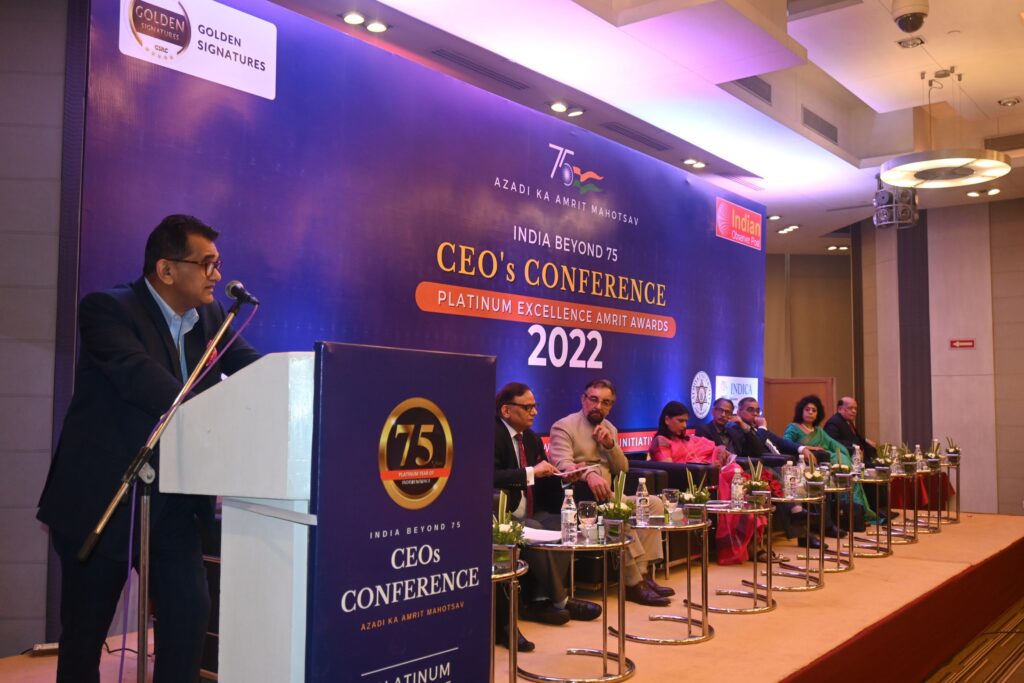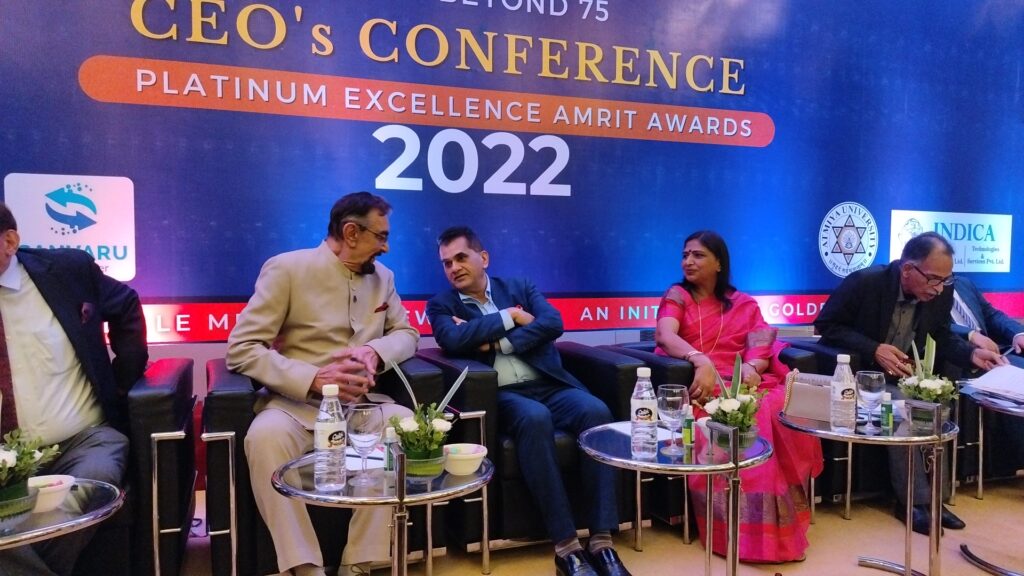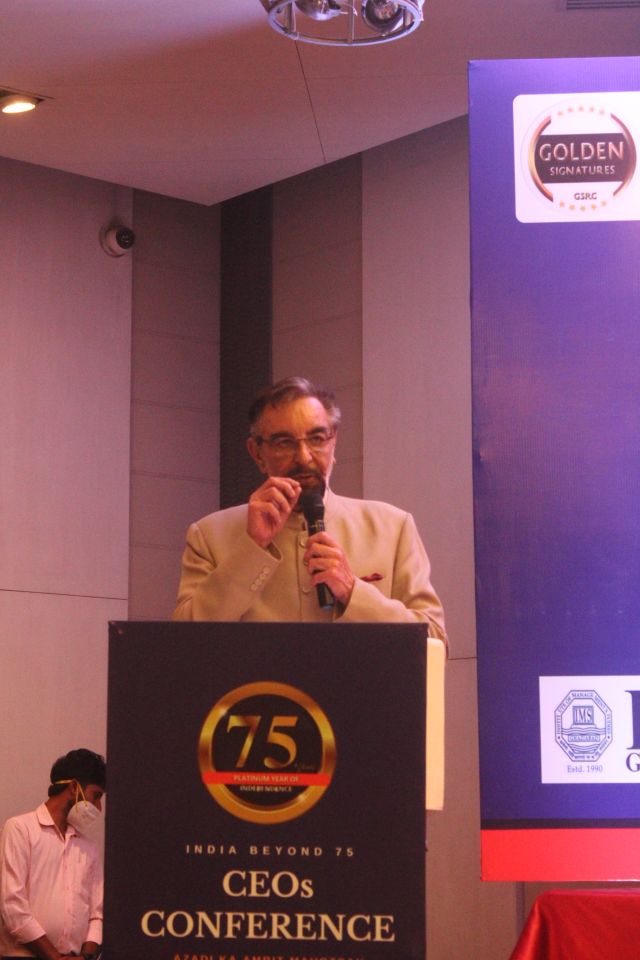Growth is not driven by the government but by organizations. So, making enterprises more competent is the key
 KRC TIMES Desk
KRC TIMES Desk

India needs to grow at about 9-10 percent GDP rate for the next two and a half decades translating into higher per capita income for its people said Amitabh Kant, Sherpa, G20 and former CEO of NITI Aagog while delivering a keynote address at ‘India Beyond 75: CEO’s Conference’ held in New Delhi.
Amitabh Kant said, “We are in the midst of preparing for the G20 summit. G20 members are the 20 most developed countries in the world, having 88 % of global GDP, 80% of global trade, 90 % of global patents, and 67% of the global population. In addition to G20, we interact with other countries who are also invited which make out actually 40 to 42 countries, and heads of IMF, and World Bank all will be here so it will be probably the highest gathering in India. Therefore it’s a great opportunity to present both the hard and the soft power of India in front of the world.

“Our Prime Minister is talking about Azadi ka Amrit Mahotsav. It’s important to understand the context of what he says because when India became independent in 1947 and today we are at 75 years, he is looking at the next 25 years. When India became independent, our per capita GDP was more than the per capita GDP of China and Korea and since then income in Korea has increased by 37X in China the growth is 18X and in India, it is 7X since 1947 and now income in Korea is 5X that of India and China is 2x of India in the present time of 2022,” Kant said.
“When Prime Minister is talking about AzadikaAmritMahotsav, he is talking about changing India in one generation – how to transform India in one generation? It’s very important to understand because several countries in the world have actually transformed themselves within one generation. So, Japan from 1956 to 1973 actually had an average growth rate of 9.6% and within that period of 56 to 73 totally transformed itself into a rich country and raised the living standards of its citizens above the boundary line. If you look at Korea between 1960 to1990, it again grew at 9.6% and if you look at China they were at the same level as us during 1988. But from 1995 to 2010 – in 15 years they grew at a scorching rate. It is important to understand that when you grow up at high rate of 9.5 / 9.6 – 10% of compounding power of growth is very important and Singapore 1960 to 1992 grew at 8.6%,” Mr. Kant said.
He said “while we are the fifth biggest country and we are heading towards the third largest economy in the world. Everybody has an individual biometric; everybody has a mobile to transact data. India has more digital financial transactions than both China and USA put together”.
Stressing the need to build infrastructure in a decarbonised way, weaning off heavy dependence on agriculture in the economy and leapfrogging technology will be critical enablers in India’s economic growth story, going forward.
If you want to grow at 6% by 2047 you will take the per capita GDP of your citizens from 6000 to 6100 dollars. If you grow at 8% you will take 12,622 dollars. If you grow at 10% you grow at 21000 dollars. You will transform the life of your citizens by 21000. That is the compounding power of the growth – why Korea and China are able to transform the lives of their population because they grew at 8 to 10% of compounding power,” Kant explained.
“Everybody will say that there is good demography and a good young generation but what is important to understand by a new survey that has come up that says, India has very sharp decline in fertility rates and India’s population is now stabilizing and its population will not grow rapidly – so now fertility rate is falling. According to this latest survey there are more women than men and it will be difficult for India to grow without the major focus on women and without increasing female labor participation,” Mr. Amitabh Kant said.
Talking about massive digitalization in the country, Amitabh Kant said, “In India, there are more Internet users in villages than in cities and India has unique digital public platforms that will transform India in many ways – individual identity, individual payment, you have UPI, and Indians are using mobile phones for transacting the money.”

He further said, that “While we are the fifth biggest country and we are heading towards the third largest economy in the world. Everybody has an individual biometric, everybody has a mobile to transact data. India has more digital financial transactions than both China and USA put together.”
Stressing on the importance of the State’s growth, Kant said, “The government of India unlike other countries during COVID increased liquidity and is now suffering from inflation. Due to digital transactions money could be easily transformed and nobody would fall below the poverty line. During COVID large number of reforms were carried out in the Indian economy – goods and services, tax, insurance, corporate tax. But India is very large, you need States to grow. Maharashtra, Gujrat 2X, Goa 5X others are just in some percentage. It’s important for our states to grow.”
Giving a roadmap for India’s growth in the next 25 years, Amitabh Kant said, “World class global Infrastructure: Roads, Aviation are the key drivers of growth. So, the strategy should be to move towards urbanization and manufacturing driven urbanization. The GDP of Mumbai is more than UP. The GDP of Mexico is more than the GDP of India. Tokyo and Osaka’s GDP is more than the GDP of India. So, sustainable and good urbanization creates good quality jobs and what’s important is that this government is talking about smart cities, sustainable urbanization, and planning.”
“Growth is not driven by the government but by organizations. So, making enterprises more competent is the key. Thus, the Government has to be a facilitator. And at last, India needs to be technologically competent. India needs to disrupt technological innovation – electronic mobility, mobile manufacturing, etc.,” Kant said.
Amitabh Kant also conferred India @75 Platinum Excellence Life Time Achievement Amrit Award 2022 to renowned Film Actor Kabir Bedi (for his contribution to Performing Arts Internationally) and a few others on this occasion.

The event organized by the Golden Signatures Research & Consulting was held to commemorate India’s completion of the 75th year (platinum year) of independence and to celebrate its 76th Independence Day on 15th August 2022 at Hotel Le Meridien, New Delhi.
The Special Felicitation with honour was presented By Golden Signatures, in association with DIMC Trust, BloomHo Global, Indian Observer Post, Corporate Tycoons magazine, Dignity India, Activbrainz, E&M Global, & NFA Post to Amitabh Kant for his Visionary Leadership & Development Impact.
Onkareshwar Pandey, founder & CEO of Golden Signatures while welcoming Amitabh Kant said, “The man who not only authored Branding India: An Incredible Story in 2009 but was himself a key driver in branding India in a most incredible way. Amitabh Kant as the Chief Executive Officer of NITI Aayog will always be remembered as the benchmark of visionary administrative excellence for his great pioneering work and his contributions to nation building. He led and wrote the golden chapter of Growth and Governance of India through various Transformational Ideas and initiatives such as ‘Make in India’, ‘Startup India’, ‘Incredible India’, and ‘God’s Own Country.”
“Whether it has been digitalization, start-ups, innovation, improving learning and health outcomes, monitoring and evaluation as well as the transformation of the aspirational districts, NITI Aayog under Amitabh Kant’s dynamic leadership, played a key and critical role. From formulating National Strategy for New India to saving the nation during the most traumatic period of Covid-19 your dynamic leadership will always be remembered,” Mr. Pandey said.
Dr. Pooran Chandra Pandey while introducing Amitabh Kant at the Conference, highlighted the importance of India’s G20 presidency starting in December of this year and lasting until November 2023. G20 presidency of India, he said will offer an opportunity to showcase the country’s growing influence in geopolitical and international economic cooperation domains among others. During the G20 meetings, he further highlighted that T20 meetings would also bring governments and nonstate actors together to deliberate on a number of socio-economic, climate, technology, sustainability, and entrepreneurship issues and find solutions to humanity’s challenges in the new world order.
Prof. Dr. Mrs. Pankaj Mittal, Secretary General, Association of Indian Universities, New Delhi spoke about the transformation taking place in the higher education space, especially in terms of content, delivery, and assessment and the role of technology in improving the access and quality of education. The NEP 2020 if implemented in letter and spirit has the potential of converting India into a Vishwa Guru.
Prof. BK Kuthiala, Chairman, Higher Education Council, Govt of Haryana while chairing the Education session expressed his confidence that “Bharat of next twenty five years will emerge as the leader in ‘knowledge economy’ and ‘spiritual wellness. He further said, “Paradigm of the entire education system will change from being teaching-centric to learning-centric. The role of teachers will change to facilitators for learning. Much of the learning will be individualized and from digital resources and classrooms will perform as brainstorming platforms. ‘Amrit Kaal’, the period between 2022 to 2047 will witness reversing the process of brain drain and Bharat will become the hub of value based education that will help in the evolution of Homo sapiens to Homo deuce.”
Amb Anup K Mudgal, the Former Indian High Commissioner to Mauritius who chaired the plenary session, said, “Humans possess an extraordinary capacity for dreaming. Individuals dream but societies and nations convert these dreams into logical visions. As a civilization, the Indians and India have been envisioning their future for centuries over and over through generations, an important one was for independence. As we complete 75 years, we appreciate the achievements of this fascinating journey. In achieving our vision, we have come a long way, but much more lies ahead. Seventy fifth anniversary is a good time for another bold vision as to where we wish to be at the centenary of our independence in the next 25 years”.
Dr Mahadeo Jaiswal, Director, IIM, Sambalpur, Odisha said that “Currently 3 type of disruptions ie due to Digitalisation, Decarbonisation, and Democratisation of business happening all over world and India is well positioned to take advantage in all 3 fronts along with the right reforms by the government.”
Dr. Bhimraya Metri, Director, IIM Nagpur said, “India Beyond 75 is going to be New India. There is a huge transformation in the education sector due to NEP 2020. Since skills have a shorter life, along with knowledge, Values & Competencies (Skills), Capability is going to play a key role in this fluid world to prepare Change Masters who can lead Unknown roles in unborn companies. Thus skilling & upskilling are the ways to remain in the present world.”
Dr. Nikhil Kant, Climate Enthusiast & Deputy Director, AICTE, New Delhi who moderated the Session -1 Panel Discussion on TECHNOLOGY, ENVIRONMENT AND SUSTAINABLE DEVELOPMENT OF INDIA: Revolution in Green Mobility: From EV to Aero while elaborating the main components of the Theme of the panel discussion, emphasized that the survival of the human lives has been at the center of the concepts of Technology, Environment, Sustainable development, and Green mobility. Having a panel discussion on this theme is an attempt to underscore that there is an urgent need to shed the hypocrisy that we are making efforts to save climate and mother earth. We need to admit honestly and sincerely that humans are trying to save their own survival.
Advertisements | 5E For Success

Join KRC Career Membership Program
KRC Career Membership Program is the first step toward an evolved career-building support system powered by KRC Foundation. Ideal for students and job seekers. Mail resume to- 5eforsuccess@gmail.com


